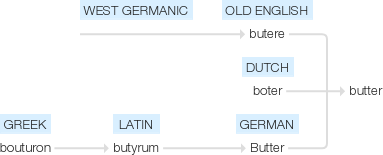Butter
Old English butere, of West Germanic origin; related to Dutch boter and German Butter, based on Latin butyrum, from Greek bouturon .
wiktionary
From Middle English buter, butter, from Old English butere, from Proto-West Germanic *buterā, from Latin būtȳrum, from Ancient Greek βούτῡρον(boútūron, “cow cheese”), compound of βοῦς(boûs, “ox, cow”) and τῡρός(tūrós, “cheese”).
butt + -er
Derived from the aviation slang term
etymonline
butter (n.)
Old English butere "butter, the fatty part of milk," obtained from cream by churning, general West Germanic (compare Old Frisian, Old High German butera, German Butter, Dutch boter), an early loan-word from Latin butyrum "butter" (source of Italian burro, Old French burre, French beurre), from Greek boutyron. This is apparently "cow-cheese," from bous "ox, cow" (from PIE root *gwou- "ox, bull, cow") + tyros "cheese" (from PIE root *teue- "to swell"); but this might be a folk etymology of a Scythian word.
The product was used from an early date in India, Iran and northern Europe, but not in ancient Greece and Rome. Herodotus described it (along with cannabis) among the oddities of the Scythians. In old chemistry, applied to certain substances of buttery consistency. Butter-knife attested from 1818.
butter (v.)
Old English buterian "spread butter on," from the same source as butter (n.). Figurative meaning "to flatter lavishly" is by 1798 (with up (adv.), in Connelly's Spanish-English dictionary, p.413). Related: Buttered; buttering. To know which side one's bread is buttered on is to be able to take care of oneself.
